Related Research Articles

Monopoly is a multiplayer economics-themed board game. In the game, players roll two dice to move around the game board, buying and trading properties and developing them with houses and hotels. Players collect rent from their opponents and aim to drive them into bankruptcy. Money can also be gained or lost through Chance and Community Chest cards and tax squares. Players receive a salary every time they pass "Go" and can end up in jail, from which they cannot move until they have met one of three conditions. House rules, hundreds of different editions, many spin-offs, and related media exist.

Steve Jackson Games (SJGames) is a game company, founded in 1980 by Steve Jackson, that creates and publishes role-playing, board, and card games, and the gaming magazine Pyramid.
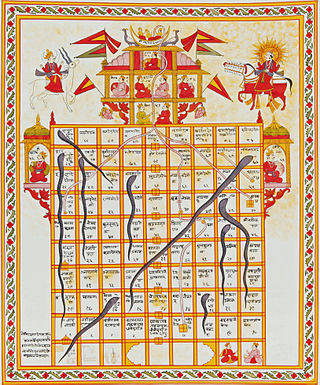
Snakes and ladders is a board game for two or more players regarded today as a worldwide classic. The game originated in ancient India invented by saint Dnyaneshwar as Moksha Patam, and was brought to the United Kingdom in the 1890s. It is played on a game board with numbered, gridded squares. A number of "ladders" and "snakes" are pictured on the board, each connecting two specific board squares. The object of the game is to navigate one's game piece, according to die rolls, from the start to the finish, helped by climbing ladders but hindered by falling down snakes.
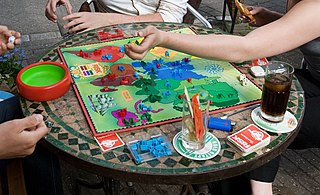
Risk is a strategy board game of diplomacy, conflict and conquest for two to six players. The standard version is played on a board depicting a political map of the world, divided into 42 territories, which are grouped into six continents. Turns rotate among players who control armies of playing pieces with which they attempt to capture territories from other players, with results determined by dice rolls. Players may form and dissolve alliances during the course of the game. The goal of the game is to occupy every territory on the board and, in doing so, eliminate the other players. The game can be lengthy, requiring several hours to multiple days to finish. European versions are structured so that each player has a limited "secret mission" objective that shortens the game.
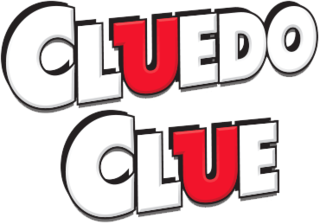
Cluedo, known as Clue in North America, is a murder mystery game for three to six players that was devised in 1943 by British board game designer Anthony E. Pratt. The game was first manufactured by Waddingtons in the United Kingdom in 1949. Since then, it has been relaunched and updated several times, and it is currently owned and published by the American game and toy company Hasbro.

Avalon Hill Games Inc. is a game company that publishes wargames and strategic board games. It has also published miniature wargaming rules, role-playing games and sports simulations. It is a subsidiary of Hasbro, and operates under the company's "Hasbro Gaming" division.

Boggle is a word game introduced in 1972 and in which players try to find as many words as they can from a grid of lettered dice, within a set time limit. It was invented by Allan Turoff and originally distributed by Parker Brothers.

Sorry! is a board game that is based, like the older game Ludo, on the ancient Indian cross and circle game Pachisi. Players move their three or four pieces around the board, attempting to get all of their pieces "home" before any other player. Originally manufactured by W.H. Storey & Co in England and now by Hasbro, Sorry! is marketed for two to four players, ages 6 and up. The game title comes from the many ways in which a player can negate the progress of another, while issuing an apologetic "Sorry!"

Yahtzee is a dice game made by Milton Bradley. It was first marketed under the name of Yahtzee by game entrepreneur Edwin S. Lowe in 1956. The game is a development of earlier dice games such as Poker Dice, Yacht and Generala. It is also similar to Yatzy, which is popular in Scandinavia.
Button Men is a two-player dice game invented by James Ernest of Cheapass Games, first released in 1999.

Space Crusade is an adventure board game produced by Milton Bradley together with Games Workshop and was first made in 1990. It was produced in the UK and available in some other countries including Finland, Ireland, France, Spain, Denmark, Australia, Hellas and New Zealand. In Germany, Italy, Belgium and the Netherlands, it is known as Star Quest.

Napoleon, subtitled "The Waterloo Campaign, 1815", is a strategic-level block wargame published by Gamma Two Games in 1974 that simulates the Battle of Waterloo. A number of versions of the game have been produced by Avalon Hill and Columbia Games.

Hare and Tortoise is a Eurogame designed by David Parlett in 1974 and first published by Intellect Games. In 1978 it was released by Ravensburger in Germany, and received generally positive reviews critically and won the 1979 Spiel des Jahres. It has since sold some 2 million units in at least ten languages. The current editions are published by Gibsons Games in the UK, Ravensburger in Germany and Rio Grande Games in the United States.
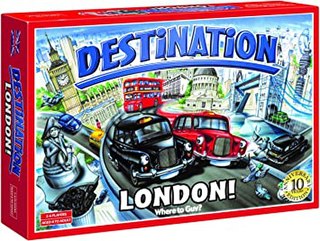
Destination is a brand of roll-and-move board games first published in 2004. In the original taxi-themed version, players compete as taxi drivers to acquire play money by moving from destination to destination across the board using dice. The game combines chance from rolling dice and drawing chance cards with a degree of strategic decision-making in planning routes and managing resource cards.

Pandemic is a cooperative board game designed by Matt Leacock and first published by Z-Man Games in the United States in 2008. Pandemic is based on the premise that four diseases have broken out in the world, each threatening to wipe out a region. The game accommodates two to four players, each playing one of seven possible roles: dispatcher, medic, scientist, researcher, operations expert, contingency planner, or quarantine specialist. Through the combined effort of all the players, the goal is to discover all four cures before any of several game-losing conditions are reached.

The Great Recession was a period of market decline in economies around the world that occurred from late 2007 to mid-2009. The scale and timing of the recession varied from country to country. At the time, the International Monetary Fund (IMF) concluded that it was the most severe economic and financial meltdown since the Great Depression.

The Game of Life, also known simply as Life, is a board game originally created in 1860 by Milton Bradley as The Checkered Game of Life, the first ever board game for his own company, the Milton Bradley Company. The game simulates a person's travels through their life, from early adulthood to retirement, with college if necessary, jobs, marriage, and possible children along the way. Up to six players, depending on the version, can participate in a single game. Variations of the game accommodate up to ten players.
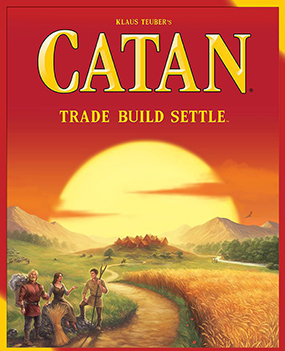
Catan, previously known as The Settlers of Catan or simply Settlers, is a multiplayer board game designed by Klaus Teuber. It was first published in 1995 in Germany by Franckh-Kosmos Verlag (Kosmos) as Die Siedler von Catan. Players take on the roles of settlers, each attempting to build and develop holdings while trading and acquiring resources. Players gain victory points as their settlements grow and the first to reach a set number of victory points, typically 10, wins. The game and its many expansions are also published by Catan Studio, Filosofia, GP, Inc., 999 Games, Κάισσα (Káissa), and Devir. Upon its release, The Settlers of Catan became one of the first Eurogames to achieve popularity outside Europe. As of 2020, more than 32 million copies in 40 languages had been sold.
Plaid Hat Games is a United States–based board game studio. Plaid Hat Games was founded in 2009. Board game designer Colby Dauch formed the board game publishing company in order to release the company's first game, Summoner Wars.

Godsfire is a science fiction board wargame published by Metagaming Concepts in 1976 that simulates planetary empire building, economics, and diplomacy. The game was reissued by Task Force Games in 1985.
References
- 1 2 3 Hatherley, Bruce E. (11 June 1985). "Financial board game".
- 1 2 3 "Poleconomy". TheGames.co.nz. The Games. Archived from the original on 2009-04-07. Retrieved 2009-05-06.
- 1 2 3 Thomas, Ben; David Young (2 March 2007). "Neo-liberal ideas still dominate political agenda" (fee required). The National Business Review .
- 1 2 Stickels, Georgi (26 September 1994). "A lifetime spent at board level". Business Review Weekly . 16 (37): 67.
- 1 2 Graham, George; et al. Challenging Perceptions: Twenty-five Years of Influential Ideas: The Fraser Institute 1974–1999: A Retrospective (PDF). pp. 23–24. Retrieved 2009-05-08.
- ↑ "Who is Brad Wall?". The Leader-Post. 8 November 2007. Archived from the original on 11 May 2009. Retrieved 2009-05-08.
- 1 2 Samways, Ana (8 May 2009). "Sideswipe: Under my umberlla (sic)". New Zealand Herald. Retrieved 2009-05-08.
- ↑ "Poleconomy". Tripod.com.
- ↑ Sharon Beder (2006). Free market missionaries. London: Earthscan. ISBN 978-1-84407-334-4.
- ↑ Carey, Alex. "Taking the Risk out of Democracy", p. 117. University of Illinois Press, 1997. ISBN 978-0-252-06616-0.
- ↑ Donald E. Abelson (2002). Do think tanks matter?. p. 198. ISBN 9780773523173.
- ↑ Cockburn, Paul (December 1984). "Notices". Imagine (review) (21). TSR Hobbies (UK), Ltd.: 22–23.
- ↑ Harrington, John (March 1989). "General Games". Games International . No. 3. p. 7.